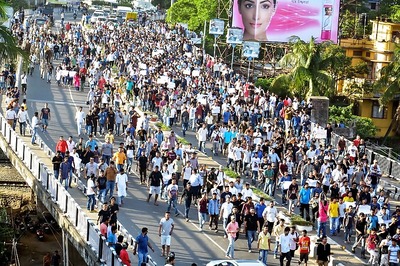
views
Mumbai: India's infrastructure firms are hoping the federal budget would bring some sops including a waiver off dividend distribution tax, minimum alternate tax (MAT) and an extension of a tax holiday for the sector.
Most infrastructure firms have a maze of subsidiaries and holding companies, and dividend tax is applicable when income is distributed from the lowest level to the next higher level, a Mumbai-based analyst said.
Dividend distribution tax is levied at 17.5 percent.
"This is against the principles of equity, because any income can be taxed only once, not 20 times so this particular provision has to be relooked," GVK Power and Infrastructure Group Chief Financial Officer Issac George said.
Though one layer of dividend distribution tax was abolished, it is still applicable for other layers, said the analyst who declined to be named.
Private equity firms are keen on investing in projects or units which offer easier exit option coupled with the relatively higher returns. These projects are often executed through special purpose vehicles.
The segment enjoys tax holidays, but is hobbled by MAT, which the players feel is double taxation.
"On one hand you say that infrastructure projects are tax exempted... on the other hand you say pay MAT," GVK Power's George said.
"So, what is the big deal here?"
At present the industry pays 18 percent MAT and surcharge and cess, taking the total to 20 percent, Shailesh Kanani, sector analyst at Angel Broking, said.
Extended Holiday
Players also want an extension of a tax holiday that ends on March 2012, which exempted companies developing infrastructure assets like roads from taxes, a Mumbai-based analyst said.
"We need huge infrastructure development in the country and that is the call of the day," MBL Infrastructures Chief Executive Officer AK Lakhotia said.
The sector needs a boost, Lakhotia said, adding that it was still in the stage of infancy.
India, behind schedule on some of its infrastructure-building targets, intends to double spending in the sector during the five years starting in 2012 to $1 trillion.
The sector is also seeking cheaper loans for projects in an economy of soaring interest rates. Since March, India's central bank has hiked lending rates seven times.
However, not all are optimistic about the budget meeting their expectations.
"Cost of funds is a function of inflation," and cannot be addressed in the budget, according IRB Infrastructure Developers Chairman and Managing Director Virendra D Mhaiskar.
India's current infrastructure investments of 5-7 percent of Gross Domestic Product need to rise to 9-10 percent for the country's "growth trajectory" to go up, Angel's Kanani said.
















Comments
0 comment